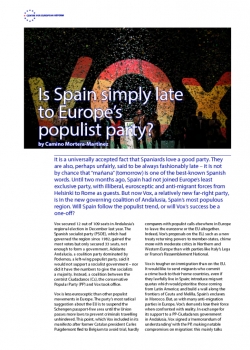
Is Spain simply late to Europe's populist party?
Few expected Spain to join Europe’s least exclusive party, the one bringing together illiberal forces. But Vox’s rise begs the question: is Spain simply late to the populist bash?
It is a universally accepted fact that Spaniards love a good party. They are also, perhaps unfairly, said to be always fashionably late – it is not by chance that “mañana” (tomorrow) is one of the best-known Spanish words. Until two months ago, Spain had not joined Europe’s least exclusive party, with illiberal, eurosceptic and anti-migrant forces from Helsinki to Rome as guests. But now Vox, a relatively new far-right party, is in the new governing coalition of Andalusia, Spain’s most populous region. Will Spain follow the populist trend, or will Vox’s success be a one-off?
#Vox, a relatively new far-right party, is in the new governing coalition of #Andalusia, Spain’s most populous region. Will #Spain follow the #populist trend, or will Vox’s success be a one-off?
Vox secured 12 out of 109 seats in Andalusia’s regional election in December last year. The Spanish socialist party (PSOE), which had governed the region since 1982, gained the most votes but only secured 33 seats, not enough to form a government. Adelante Andalucia, a coalition party dominated by Podemos, a left-wing populist party, said it would not support a socialist government – nor did it have the numbers to give the socialists a majority. Instead, a coalition between the centrist Ciudadanos (Cs), the conservative Popular Party (PP) and Vox took office.
Vox is less eurosceptic than other populist movements in Europe. The party’s most radical suggestion about the EU is to suspend the Schengen passport-free area until the Union passes more laws to prevent criminals travelling unhindered. This point, which Vox included in its manifesto after former Catalan president Carles Puigdemont fled to Belgium to avoid trial, hardly compares with populist calls elsewhere in Europe to leave the eurozone or the EU altogether. Indeed, Vox’s proposals on the EU, such as a new treaty returning powers to member-states, chime more with moderate critics in Northern and Western Europe than with parties like Italy’s Lega or France’s Rassemblement National.
#Vox is less #eurosceptic than other populist movements in# Europe. The party’s most radical suggestion about the #EU is to suspend #Schengen until the Union improves its functioning.
Vox is tougher on immigration than on the EU. It would like to send migrants who commit a crime back to their home countries, even if they lawfully live in Spain; introduce migrant quotas which would prioritise those coming from Latin America; and build a wall along the frontiers of Ceuta and Melilla, Spain’s enclaves in Morocco. But, as with many anti-migration parties in Europe, Vox’s demands lose their force when confronted with reality. In exchange for its support to a PP-Ciudadanos government in Andalusia, Vox signed a ‘memorandum of understanding’ with the PP, making notable compromises on migration: this mainly talks about reinforcing border controls (though it does not explain how) and doing more to fight migrant smuggling.
Vox’s softer position on migration in Andalusia is a rational choice. Although many people vote for Vox because they are upset about Spain’s migration policies, this is far from the only explanation for the party’s sudden popularity. Vox thrived in some Andalusian towns with many migrants, but it did rather poorly in others. And a recent poll shows that many of Vox’s voters are unhappy about differences in the distribution of wealth between Spanish regions, and the inefficient functioning of the Spanish devolved administrations.
#Vox’s proposals on the #EU, such as a new treaty returning powers to member-states, chime more with moderate critics in Northern and Western Europe than with parties like Lega or Rassemblement National.
Vox is doing fairly well in national polls. If national elections were held now, reliable polls estimate it would enter the Spanish Parliament with 12 to 13 per cent of the votes, or up to 45 seats (as a comparison, Ciudadanos has 33). If this is the case, Vox will have an important role in coalition formation. Perhaps the success of Vox both nationally and in Andalusia is that it is not a single-issue party, and it revives issues that Spain’s mainstream parties seem to have forgotten amid the noise of the financial crisis and Catalonia’s independence bid. These range from national identity to taxation to domestic violence. Many of them overlap: for example, part of Vox’s argument about national unity is based on the desire to scrap regional differences on taxation, which mean that people living in, for instance, the western region of Extremadura pay more taxes than those living in Castilla y León in central Spain.
In the long run, Vox’s success will not only be measured by the number of seats it manages to secure in the forthcoming European and regional elections, but by its ability to influence and ultimately dominate Spain’s national debate on issues like migration, security and the economy. And on that, Vox seems to be doing rather well: the PP has toughened its stance on values and national identity, as its new leader Pablo Casado rebrands the party as the “unashamed right”. Vox’s surge is also a major headache for Albert Rivera, Cs leader: his party’s membership of the governing coalition in Andalusia has attracted criticism from Rivera’s European partners. This matters, as Rivera hopes to get good results in the European elections by forging alliances with like-minded parties across the EU. The coalition in Andalusia may put off allies such as French president Emmanuel Macron or Dutch prime minister Mark Rutte, whose parties have long ring-fenced the far right.
#Vox’s success will be measured by its ability to influence and dominate Spain’s national debate on issues like #migration, #security and the #economy. On that, it is doing fairly well.
Vox will probably not take the Spanish or European parliaments by storm, though it will make its presence felt. But if the Andalusian experience is anything to go by, Spain has belatedly joined Europe’s populist party.
Camino Mortera-Martinez is a senior research fellow at the Centre for European Reform.

